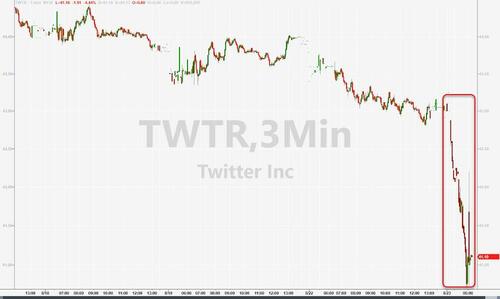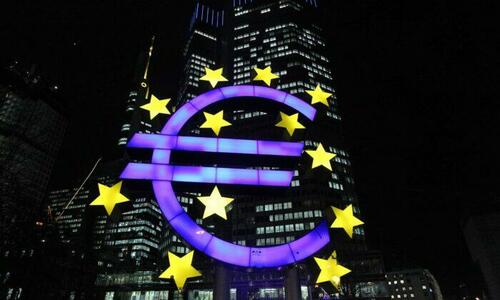Twitter Whistleblower Reveals Company Hid “Extreme, Egregious, Deficiencies”; Musk Subpoenas Dorsey & Ex-Security Chief
Update (0945ET): Twitter CEO Parag Agrawal has sent a message to staff this morning about WaPo’s whistleblower story, according to CNN’s Donnie O’Sullivan.
Agrawal’s message to staff reads:
Team,
There are news reports outlining claims about Twitter’s privacy, security, and data protection practices that were made by Mudge Zatko, a former Twitter executive who was terminated in January 2022 for ineffective leadership and poor performance. We are reviewing the redacted claims that have been published, but what we’ve seen so far is a false narrative that is riddled with inconsistencies and inaccuracies, and presented without important context.
I know this is frustrating and confusing to read, given Mudge was accountable for many aspects of this work that he is now inaccurately portraying more than six months after his termination. But none of this takes away from the important work you have done and continue to do to safeguard the privacy and security of our customers and their data. This year alone, we have meaningfully accelerated our progress through increased focus and incredible leadership from Lea Kissner, Damien Kieran, and Nick Caldwell. This work continues to be an important priority for us, and if you want to read more about our approach, you can find a summary here.
Given the spotlight on Twitter at the moment, we can assume that we will continue to see more headlines in the coming days — this will only make our work harder. I know that all of you take a lot of pride in the work we do together and in the values that guide us. We will pursue all paths to defend our integrity as a company and set the record straight.
See you all at «OneTeam tomorrow,
Parag
* * *
Update (0850ET): Following the Washington Post’s story on the Twitter whistleblower complaint, Elon Musk’s legal team said they want to interview the former head of security Peiter Zatko.
CNN’s Donnie O’Sullivan tweeted moments ago that Musk’s lawyer Alex Spiro wants to speak with the Twitter whistleblower:
“We have already issued a subpoena for Mr. Zatko, and we found his exit and that of other key employees curious in light of what we have been finding.”
NEW: Musk lawyer Alex Spiro said they want to talk to Twitter whistleblower.
“We have already issued a subpoena for Mr. Zatko, and we found his exit and that of other key employees curious in light of what we have been finding.”
— Donie O’Sullivan (@donie) August 23, 2022
* * *
One day after Elon Musk’s legal team subpoenaed former Twitter CEO Jack Dorsey as part of an ongoing effort to fight a lawsuit by the social media company to force the billionaire to move forward with the $44 billion acquisition deal. The Washington Post released a new report alleging executives deceived federal regulators and the company’s board about “extreme, egregious deficiencies” to combat hackers.
WaPo cited a whistleblower complaint from the former head of security Peiter Zatko who said some of the company’s servers are running out-of-date software, and executives withheld critical information about data breaches. Bezo’s news outlet interviewed more than a dozen current and former employees about past deficiencies.
The complaint was filed last month with the SEC, DoJ, and FTC. It said thousands of employees had access to core company software, which led to data breaches and hacks of high-profile users.
WaPo said the whistleblower document alleges executives prioritized user growth over reducing spam and rewarded executives cash bonuses up to $10 million to increase the number of daily users.
The complaint noted Chief Executive Parag Agrawal was “lying” when he said in May the company was “strongly incentivized to detect and remove as much spam as we possibly can.”
In a WaPo interview, Zatko said his decision to reveal Twitter’s failures to the public is an extension of his previous work exposing security flaws within the company.
“I felt ethically bound. This is not a light step to take,” said Zatko, who was fired by Agrawal in January. He declined to discuss what happened at Twitter, except to stand by the formal complaint. Under SEC whistleblower rules, he is entitled to legal protection against retaliation, as well as potential monetary rewards. -WaPo
A company spokeswoman, Rebecca Hahn, told WaPo that Zatko’s allegations are “riddled with inaccuracies” and that “security and privacy have long been top companywide priorities at Twitter.”
Twitter also said Zatko was fired from his senior executive role at the company earlier this year for ineffective leadership and poor performance.
Regarding the allegations about spam bots, something Musk’s legal team is requesting documents from the company. Hahn said Twitter removes more than a million spam accounts every day.
Shares of Twitter dropped as much as 4.5% on the news.
This revelation could offer Musk an ‘out’ on the deal as he could claim the security flaws are a clear material adverse change to the company; and as opposed to just a lower price, this could terminate the deal entirely – benefiting anyone who didn’t want Musk to obtain the social media company.
Tyler Durden
Wed, 08/24/2022 – 04:23
via ZeroHedge News https://ift.tt/L31I6vP Tyler Durden












